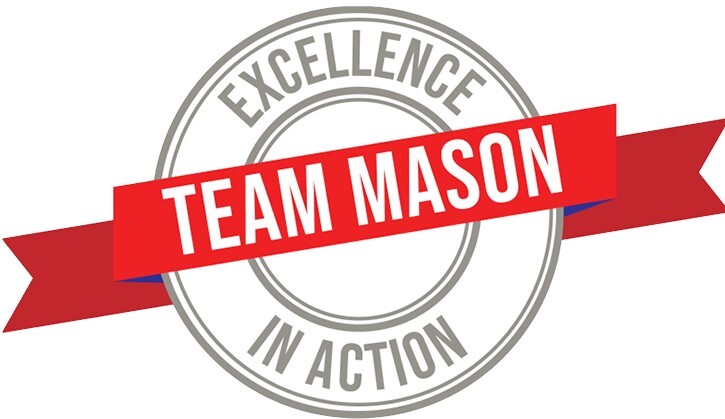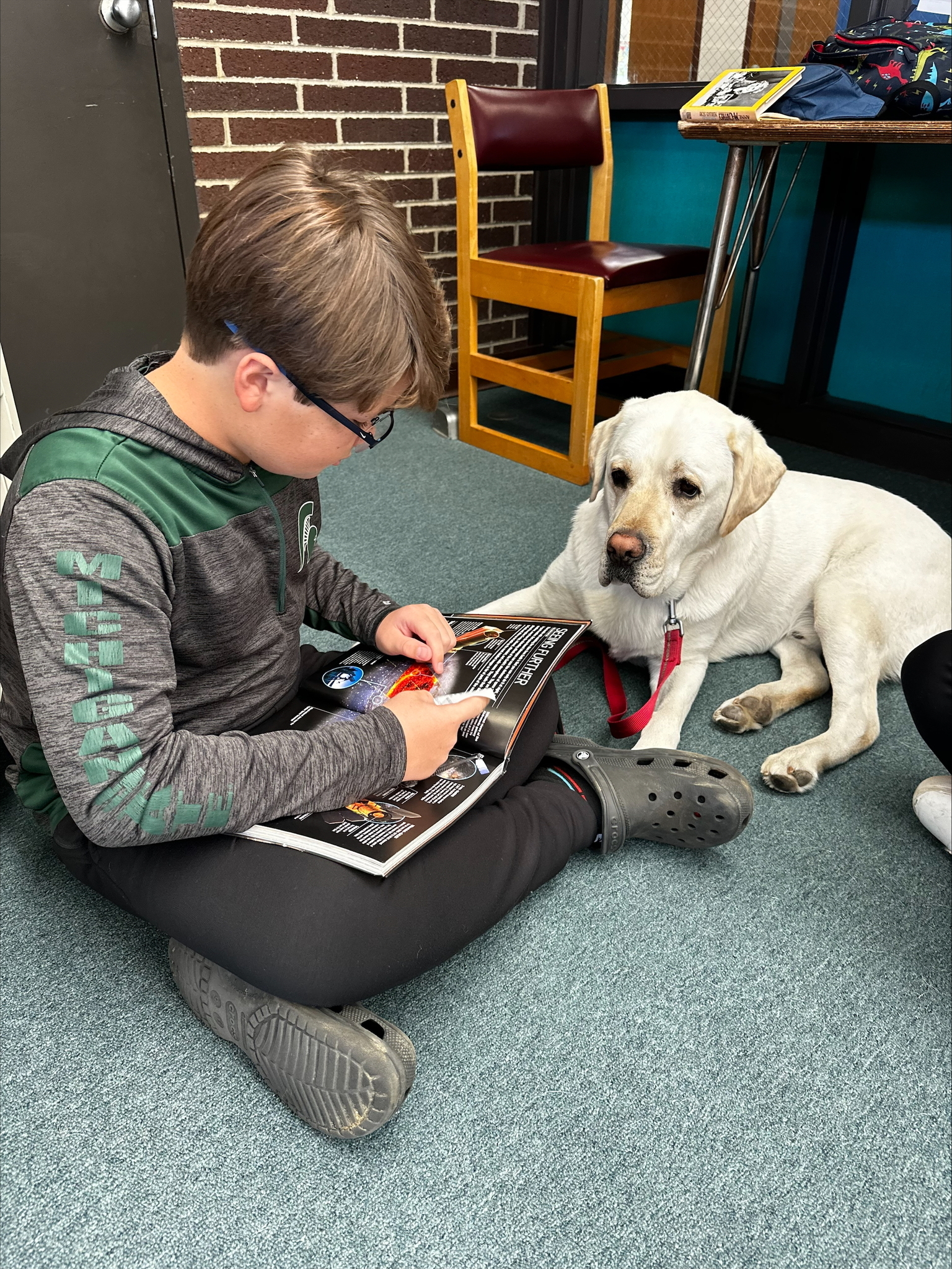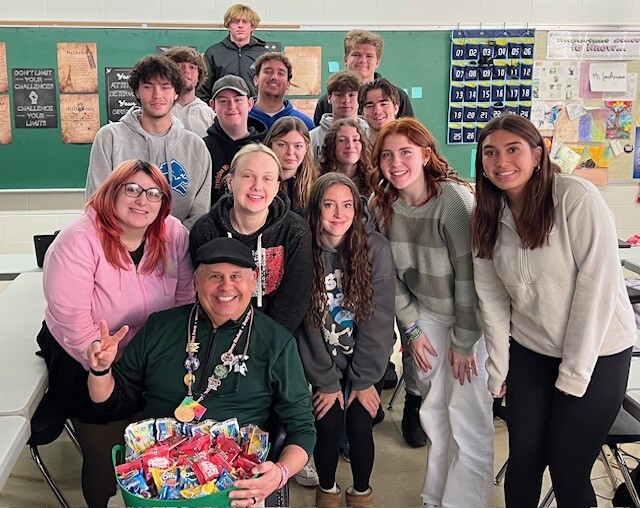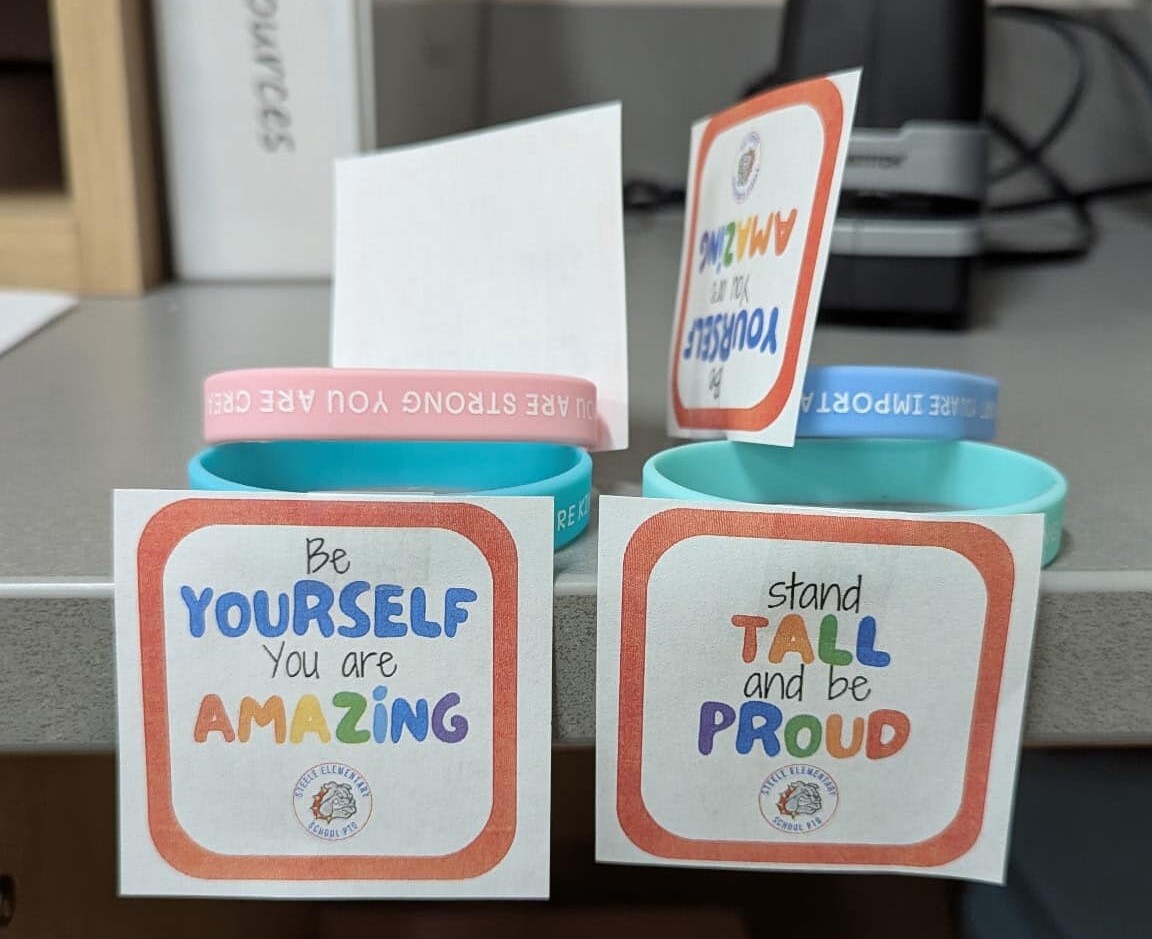Team Mason: Excellence in Action
 Team Mason articles shine a spotlight on students, teachers, programs, and projects in all buildings and grades in the district. Team Mason articles are written by Dr. Janet Alleman, instructional consultant for Mason Public Schools.
Team Mason articles shine a spotlight on students, teachers, programs, and projects in all buildings and grades in the district. Team Mason articles are written by Dr. Janet Alleman, instructional consultant for Mason Public Schools.
Dr. Alleman is Professor Emeritus at Michigan State University and has worked with Mason Public Schools since 2012 as an instructional consultant. Team Mason articles are a snapshot of her observations and experiences in classrooms and buildings throughout the district.
Team Mason 2025-26
Subscribe to RSS Feed for Team Mason 2025-26As a bonus for being a long time Wharton Center advisory member and past chair, every year I receive an invitation to their annual holiday party. This year it was held at the Michigan State University (MSU) President’s House, Cowles’ House.
Consider the last time someone gave you feedback. How did you respond and why? Perhaps it felt like a personal attack - that you were being judged - or that it threatened your control. While feedback is a complicated matter, it is built on the premise that it is crucial for growth. If given skillfully, it is intended to boost performance, increase self-awareness, motivate individuals and improve overall results by clarifying expectations and highlighting strengths and weaknesses. Are you convinced? Obviously, your position regarding feedback is based on your experiences.
On a recent rainy Friday morning, I popped into Julie Hilker’s eighth grade science class and was blown away by the engagement and enthusiasm that permeated the classroom. “What in the world is going on?” I wondered. I quickly turned to a student on a ladder and asked her to tell me what was happening. She responded, “We are doing an egg drop. Mr. Haney’s class did it yesterday.”
Mason Middle School Science Teacher Tiffany Henfling presented at the National Science Teachers annual meeting in Minneapolis. The title of her session was “Take Them to Camp,” with a focus on the power of authentic learning in the outdoors. Her goal was to inspire attendees to engage students in an outdoor experience, like camp, and be equipped with the tools to actualize it.
Now, you are probably asking, “What do crescendo and end of the trimester have in common?” Well, I think plenty! Crescendo means the highest point reached in a progressive increase of intensity, in our world, the last week of the trimester was this peak.
Throughout a host of secondary classrooms that I visited, I observed gallery walks- including a unique one done virtually, poster sessions, student-created videos, podcasts and even a rap. If you ever wanted to see state and national curriculum standards, come to life in authentic and creative ways, this was it! These projects represented inquiry, problem-solving, interpretations of novels, research focusing on climate change and much more. The level of enthusiasm and engagement was off the charts, and the finished products were generally outstanding.
Kouzes and Posner’s “The Five Star Practices for Exemplary Leadership,” identified in their original research some 50 years ago, still hold true and include:
- Model the way
- Inspire a shared vision
- Challenge the process
- Enable others to act
- Encourage the hearts
Who do you know possesses these attributes? Were you aware that at Mason High School (MHS), students have boundless opportunities to work on acquiring and refining these skills?
MHS hosted a Student Leadership Summit for students from Mason and the surrounding schools. This brought students together to share their stories, expand their leadership initiatives and create action plans for the months ahead. As I circulated through the field house where the students congregated with their teacher sponsors, I was impressed by their projects and experiences.
There’s an abundance of after school opportunities for our Mason students: From Bulldog Brilliance—a program that offers homework help—to a wide variety of clubs, athletics, top-notch robotics and an exciting new arts initiative.
Recently, Mason Public Schools (MPS) celebrated Inclusion Week. Bright and early Monday morning, I popped into Rachel Huntley’s kindergarten classroom, situated close to the school entrance, only to find her children getting ready to learn all about it.
Belonging is currently being addressed in multiple ways throughout Mason Public Schools, as well as in society at large. In her 2022 TED Talk, biotechnologist Lola Adayemi addressed the topic and explained that, as humans, we are all seeking to belong. Research also suggests the sense of belonging impacts one’s self-concept and self-esteem, as well as influences academic achievement.
Noel Nolan from Dart Container was a recent presenter to all four sections of fourth grade at Steele Elementary. While captivating an audience of approximately 90 students is no small feat, she was able to accomplish it!
2024-25 Team Mason Articles
Who Says the Last Few Days of School Are a Wash?
Who Says the Last Few Days of School Are a Wash?
Who says the last few days of school are a wash? Not this coach! As teachers and students brought the year to a close, a host of feelings bubbled up along with a bundle of learning experiences and finished projects. The positive fall out was a sense of accomplishment, pride and joy.
During Market Day at Alaiedon Elementary School the third grade classes hosted a fantastic sale of their products including, bookmarks, cookies, place mats, bracelets, lemonade and a host of other items too numerous to name. The classes had just completed an economic unit and learned all about goods and services, scarcity, and supply and demand. The event was quite the sight.
Listening in on the conversations between buyers and sellers was revealing and enlightening. At one point during the event, the teachers called for a break, at which time they asked the entrepreneurs to take stock of their inventory to determine if they needed to raise or lower prices depending on their remaining inventory of merchandise. It was a real lesson in supply and demand! I am not sure they knew much about collateral or profit margin, however, that comes later in their studies.
Students had earned money throughout the year as part of a behavior program and then they got to spend it! The entire experience was highly engaging – an event those third grade students will remember for years to come and a terrific culminating experience. Believe me, those last few days of school were not a wash in Alaiedon’s third grade classrooms.
You’d Have to Experience It to Believe It!
You’d Have to Experience It to Believe It!
The hallways of Mason Middle School were jampacked with people admiring student art displayed on tables and walls while the glow room and digital display spaces were overflowing with visitors of all ages during the annual Evening of the Arts. I heard many admirers say things such as, “I’d love to purchase this piece to hang above my fireplace,” “I wonder how much this piece costs?” and “How do I contact this artist?”
Of course, I’d be remiss if I didn’t describe the happenings in the gym and café where families and friends were “gaga” over the 7th and 8th grade band members’ performances with the jazz band and three individuals performing stunning solos. Would you believe those students committed to arriving at practice at 6:30 a.m. two mornings a week to prepare? What motivation!
The choral and drama performers created quite a stir in Café A as they showed-off their beautiful voices and their creative expression. I overheard several adults making laudatory remarks and reminding each other these performers are only 7th and 8th grade students! Wow! What talent!
Can you imagine the thought, time, effort and commitment their teachers have invested to bring this night to fruition? How lucky are our students? As I observed the audience in each of the venues, I was struck by the number of siblings and peers who were there supporting their friends in their passions! Very impressive!
In the book titled, 10-25: The Science of Motivating Young People, David Yeager reveals compelling research indicating our new generation wants status and wants to be heard. How do we accept this challenge to ensure it spreads throughout their educational and personal journey? Without question, this evening gave students a heavy dose of what they want.
If you were an attendee, I can almost guarantee you had a joyful experience and believe the arts at Mason Middle School are alive and well. If you missed the event, put it on your calendar for 2025-2026; you’ll be glad you did!
Sometimes It Takes Outsiders to Remind Us What We Have
Sometimes It Takes Outsiders to Remind Us What We Have
Recently, Mason Public Schools (MPS) hosted four graduate students from South Africa. They visited several buildings and engaged in dialogue with students, classroom teachers, mental health and restorative justice professionals as well as teacher coaches and building leaders.
The graduate students were especially impressed with the Multi-Tiered Systems of Support (MTSS), Positive Behavioral Interventions and Supports (PBIS) and restorative justice programs we have in place. Learning about our therapy dogs was also very intriguing to them as well as the many resources we have at Mason Public Schools (MPS) that we may sometimes take for granted.
Our guests were “blown-away” by our students’ level of interest and curiosity in learning about South Africa. They left saying, “The day spent in Mason Public Schools was the highlight of our trip to the United States.”
While sometimes jarring, the voice of an outsider can remind MPS it is well-off and extremely rich in opportunities!
Why Should I Care About This?
Why Should I Care About This?
While our new generation of adolescents is frequently posing this question, I am totally convinced nobody in Carla Richard’s 6th grade science class asked it during a recent session I attended. As an opener, Carla introduced Drs. Gries and Ryan to her students acknowledging they both practice at the medical facility down the street from the school.
Since the students have been learning about the human body, most recently the circulatory system, they have acquired a bank of knowledge and now are ready to see it applied up close. They were primed with questions and eager to share stories and experiences including a relative having a heart attack, a family friend diagnosed with high blood pressure, a parent about to receive a valve replacement and learning a peer was about to have an echogram - all of these authentic examples made for a highly engaging and purposeful learning experience!
Gries and Ryan delivered a masterful interactive mini presentation supported by explicit visuals. Then came the moment all the students were waiting for- the opportunity to don rubber gloves and engage in the dissection. Not only did they examine a pig’s heart, but they also had the opportunity to examine one from a cow and a deer.
The respectfulness these 6th grade students exhibited towards the specimens coupled with their responsiveness was very telling! Did they care about this? No question! Will they retain major and minor understandings about the heart? For sure! Will some consider medicine in their future? Maybe! Will they all remember this amazing learning opportunity long after they graduate? Absolutely! Will this deepen their respect for science? Very likely!
While Carla Richards would be the first to tell you every lesson can’t be like this, incorporating significant culminating experiences into units is plausible – and “hooks” students into caring!
Game Night for Kindergarteners? What’s Up with That?
Game Night for Kindergarteners? What’s Up with That?
Our teachers provide a wealth of creative learning opportunities for our families. Most recently, Rachael Huntley and Angie Chiarini invited me to Game Night at Harvey Early Childhood Center which featured two rooms filled with every age-appropriate literacy and math related board game you can imagine!
After a short introduction and directions provided by the teachers, families jumped right in – selecting a game, reading directions and playing and switching games at appropriate times. It was such an engaging hour and time simply evaporated, just ask any of the players!
At the conclusion of game playing, children and their families participated in a debrief. They pointed out high engagement, connectedness, having a special night of love and laughter with just their kindergarteners and having an opportunity to focus. As you may guess, this is often a rare occurrence for busy families!
You might still be thinking, “So what’s the big deal about playing board games with your kiddos?” Obviously, board games enhance math and literacy skills, but there are a host of other benefits. Board games serve to develop social skills, cooperation, turn-taking, sharing, critical thinking, increased attention span and the ability to focus on a single task. You have probably observed some of these skills waning, as many are not easily acquired through virtual experiences.
Game Night for kindergarteners? You bet! I can think of no better way to ignite interest in literacy and math than through the power of board games.
Did Our Chamber of Commerce Make the Right Choice?
Did Our Chamber of Commerce Make the Right Choice?
North Aurelius Resource Teacher Allison Altenberger-Olson was honored at the annual Chamber of Commerce banquet by receiving the Excellence in Education award. In the nomination letter from her principal, Mike Prelesnik, he said, “One of Allison’s greatest strengths is her caring nature for each of her students. She’s an advocate and truly makes a difference for each of their lives.”
Allison serves as a teacher mentor for current Michigan State University education students sharing her passion with them. In 2022, she was honored by the Michigan Lottery with their Excellence in Education Award, a testimony to her commitment and impact in the classroom.
Certainly, at the heart of Allison’s teaching philosophy, and what I notice as I observe her in action at North Aurelius, is her innate ability to foster strong relationships with both students and colleagues and orchestrate collaborative practices which are engaging and yield inclusive learning experiences for all students.
Allison prides herself in being positively obsessed with research that can contribute to and enhance her practice. Her eyes dance when you ask her to describe her students and the exceptional progress they are making. She says her goal is for all her students to become independent! Her many strategic best practice moves are mighty convincing! During our interview, she mentioned she sees herself as a student in her own classroom– a sophisticated mindset and one that embraces reflection, an essential piece of stellar instruction.
The host of testimonials from highly qualified educators coupled with a look at her resume leave no space to question her worthiness. Was Allison the right choice? Unequivocally, yes!
Oops! What Did I Miss?
Oops! What Did I Miss?
Angie Thompson and Trish Byrnes, our Steele Elementary interventionists, orchestrated a Literacy Night for families aimed at offering insights to all the ways families can support their children in becoming successful readers and writers while finding joy in their learning.
As part of the planning process, parents were surveyed to help establish the evening’s offerings. The event ended up including a mini session on assessing CONNECT software, a demonstration and explanation about the “zones of regulations,” strategies for modeling the “digital world,” a scavenger hunt illustrating a technique for fostering critical and analytical thinking and even a book swap!
While you often hear it said, “It takes a village,” it REALLY DOES! On this night, families were gently reminded that active participation in their children’s development is critical for achieving success.
Just a reminder, be on high alert! Don’t let those Mason Public Schools communications go unread. The community’s tax dollars are wisely invested in Mason students – and you don’t want to miss out!
March Madness in the Classroom
March Madness in the Classroom
You expect to see March Madness occur on the court and on the ice, but what if I told you it goes on in Mason elementary classrooms? Don’t worry—this version of March Madness is all about books!
In classrooms, I listened to read-alouds of 16 books selected by the staff. Each day, students listened to one book and completed a series of learning activities in a student packet. These activities focused on topics such as genre, characters, setting, author’s purpose, vocabulary, connections, predictions, rating, and much more! Every class voted virtually each day. Once all votes were in, calculations were made and the winner moved on to the next bracket.
Returning to North Aurelius for the finals of March Madness of books was a sight to behold with students making one final pitch for their favorite book. It felt like I was at the NCAA Final Four! Then the big moment: the final vote was submitted and moments later, Mike Prelesnik announced the champion, Are You a Cheeseburger? I’m just glad North Aurelius’ roof was secure! The place went crazy! (Oh, if only our students could be this excited about reading every day!)
This creative initiative led by the second-grade teachers and embraced by the entire faculty and staff, highlights the importance of reading and literacy. It serves as a reminder that literacy isn’t just a checklist of skills. Instead, it’s a gateway to both intellectual and personal growth. It definitely encourages reading more and enjoying more!
You are probably wondering what went on during Reading Month at Alaiedon, Steele, and Harvey as well. Those buildings were also buzzing with excitement! Mystery and volunteer guest readers—including parents, administrators, teachers and local business owners—visited classrooms to read aloud. In fact, when I tried to sign up at one school, I got the last available spot. Talk about supply and demand!
The importance of reading is huge —not just in March, but every day. Whether students are reading alone, to others, to a pet or stuffed animal or listening to someone else read to them, daily reading builds a strong foundation for learning.
For anyone reading this story, I challenge you to do what you can to ensure Reading Month becomes “Reading Months” – in every month! Be part of the fun: serve as an audience, take a child to the library, give a book as a gift—do anything you can to help reignite our community’s love for reading and invest in a literate, empowered future for Mason’s children.
What Is Going On During After-School Hours in Mason? You Won’t Believe the Opportunities!
What Is Going On During After-School Hours in Mason? You Won’t Believe the Opportunities!!
There’s an abundance of after school opportunities for our Mason students. From Bulldog Brilliance—a program that offers homework help—to a wide variety of clubs, athletics, top-notch robotics, and now, an exciting new Arts Initiative.
Recently, Alaiedon and North Aurelius Elementary Schools were both selected for a special performing arts program sponsored by the Wharton Center—an achievement that’s never happened before! The program includes about 80 students in grades 3–5 who are rehearsing twice a week for an upcoming Disney-themed performance. How can it get better?
I popped into practices at the two sites and was totally enamored by what was happening with our collaborating teachers and visiting artists from the Wharton Center as they’re leveraging our students’ hidden talents. What great experiences for these young lives! Stay tuned for performing dates at the local buildings and high school – with a culminating experience at the Wharton Center!
Mason Public Schools has it ‘going on’ for our students!
Student Voice: So What’s the Big Deal?
Student Voice: So What’s the Big Deal?
It’s no secret that class discussions, debates, inner/outer circle activities and other strategies that promote student voice are waning in many settings. While it’s easy to blame COVID-19—and the increased use of technology by adolescents (and adults!)—the result is clear: students are speaking up less. Many even report feeling extreme stress when asked to talk in class. So, what are we doing about it? Of course, first we must be sure we foster emotionally safe spaces for communication and voice.
Mason Middle School Teacher Tiffany Henfling has discovered a powerful strategy to support student voice: the Consensus Meeting. This approach is student-centered, interactive, engaging, reflective and meaningful. It supports differentiation, uses data to drive discussion, and encourages student participation. Even more, it gives Tiffany insight into what her students are thinking—their understandings and misunderstandings—and invites them to ask their own questions.
After observing several of these sessions in Tiffany’s classroom, I can say firsthand how powerful they are. Students are actively engaged, using body language, making eye contact, and offering thoughtful comments about the process. Several of Tiffany’s colleagues have also observed her in action, and they’re now beginning to implement the strategy in their own classrooms.
With a little nudging, Tiffany submitted a proposal to present at the State Science Teachers’ annual conference. Earlier this month, she took the stage at The Lansing Center. A room full of eager participants joined in an interactive discussion about the “what,” “why,” and “how” of the Consensus Meeting. To top it off, the audience took part in a live session themselves, which helped them truly understand its potential.
Of course, every strategy has its tradeoffs and during the presentation, Tiffany was able to have an open and honest discussion about them. Yes, Consensus Meetings can sometimes take a lot of time, but because there’s so much content to cover. They also shift control to students, which can feel risky and make teachers feel vulnerable. But the payoff is clear: students who believe they have a voice in the classroom are seven times more likely to be academically motivated than those who don’t. (Quaglia Institute School Voice and Aspirations, 2016)
For those still unconvinced that student voice really is a big deal, check out the recent 10-25: The Science of Motivating Young People by David Yeager. It’s mighty compelling!
“Why Should I Care About This?”
Recently, I read and shared two compelling articles with several teachers: “Why Should I Care About This?” and “Why Do I Need to Know This?” Both explore a growing concern in education—students want to understand how what they’re learning connects to their future. So how are we, as educators, responding?
Monica Norton, our high school German teacher, took this challenge seriously. She designed an end-of-trimester project aligned with course standards that asked students to answer the question: “How can German help me in my future?”
The project required students to identify career interests, explore literature related to that field, interview at least one professional in the area, and create a PowerPoint, poster, or other visual. Their chosen medium had to include the most salient findings and be presented to an authentic audience prepared to give individual feedback.
As expected, the day of presentations brought some tension and uncertainty. Given what we know about the current levels of grit and resilience among students, this reaction wasn’t surprising. But I can attest that our students rose to the occasion!
Monica followed up by asking the students to reflect on the experience. Common responses included: how being bilingual positively influences one’s salary, surprise at the many ways German could impact their lives—whether in government, foreign affairs, medicine, construction, engineering, technology, etc. Many admitted that next time, they would start their projects sooner, labeling themselves as procrastinators. Others noted they would practice their presentation in front of friends and family or tweak visuals. One thing was clear—no one thought the project was easy.
Plaudits to Monica for “stepping out of the box,” trying something new and celebrating success! When asked, “would you do it again?” she eagerly responded, “No question, I care about this!”
What’s the Reset Narrative All About?
What’s the Reset Narrative All About?
Can we push a button to reset? Sometimes it is not that simple, but a reset routine can provide comfort as we work to regain rhythm and adjust to new practices.
During Winter Break, many families enjoy a more relaxed routine with two weeks of being able to go to bed late, sleep in, eat whatever and whenever, ignore routines and enjoy downtime.
When “back to school” day arrives, many families admit to breathing a sigh of relief to be back in a routine. But it can be a tall order for our teachers and support staff to magically call for business as usual when students return on the first day back!
In the weeks after break, I spent a lot of time visiting classrooms and observing all the powerful ways our gifted teachers help students reset. Every child has had unique experiences and emotions over the break and our teachers and support staff must orchestrate the learning and behavior of 20-28 students every day, all day. What a feat!
While a routine reset is typically more apparent for our younger students, it occurs in multiple forms across the grades. Students were reminded of classroom expectations through a BINGO game and took part in gallery walks to review behavior guidelines and cognitive reviews. I stumbled into a guided student tour of public spaces such as the office, hallways and lunchroom where explicit guidelines about behavior were discussed.
I had a chance to observe more than 80 kindergarteners interacting with a teacher team about their behavior using familiar pictures, charts and video clips to jar their memories. Believe it or not, learner engagement was off the charts!
As I meandered through the second floor hallways at Steele Elementary, I saw New Year’s resolutions and goals posted on student lockers – another clue conversations about a reset, change and growth were in the air. Resolutions included things like, “be responsible,” “don’t fake being sick,” “don’t trash the place,” “keep the snow outside,” “no drama,” “read every day,” “think positively about yourself,” “learn from your mistakes,” and “don’t be afraid to fail” made me realize the power of educating and caring for the whole child. It is so important – and complicated!
While minor resets occur throughout the year, make no mistake that the biggies occur after extended times away from the comfortable rhythms. Hopefully, you have reset yours! If you have an extra moment, consider texting or emailing your student’s teachers to thank them for the resets they skillfully engineer. They don’t just naturally happen. They take time, energy and special talent.
“What’s Going on in the Library at MMS?”
“What’s Going on in the Library at MMS?”
Well, if you ask the researchers, reading scores nationally have plummeted – not surprising with all the gadgets and online platforms available!
scores nationally have plummeted – not surprising with all the gadgets and online platforms available!
But I witnessed reading in action in the Mason Middle School library. One Monday morning, I arrived unannounced at the library to find Carla Richards’ sixth grade class circled up on the rug with Walter, the visiting therapy dog whose specialty is listening to students read. All were attentively listening to their teacher’s explanation of what book she was currently reading and the character in the book she identified with and why. After all, modeling is the most powerful tool teachers possess!
Quickly, she shifted to asking her students to do the same regarding a character in a book they were reading. If they couldn’t identify with any characters, she asked that they give reasons why not. Giving purpose to silent reading is essential, and asking for accountability establishes expectations that all students need to be actually reading!
The “frosting” to this Monday morning experience was giving these sixth graders the option of reading with Walter. While you might be rolling your eyes on this one, reading to a therapy dog has been proven to offer several benefits including helping students improve their reading skills, building confidence, developing a positive association with reading, creating a relaxed atmosphere where students can practice reading to a non-judgmental listener without fear of criticism and enhancing motivation. These things can also all lead to increased levels of serotonin and dopamine chemicals in the body which are associated with positive feelings!
At the conclusion of this amazing library session, students circled up on the rug, once again, to talk about their characters. Walter wagged his tail as if to say, “Great job, kids!” Who would have thought Walter would be praising middle schoolers on a Monday morning in the library?
Why All the Flags?
There’s a lot more that goes on in school besides what is in the books! For example, on November 11, 2024, I popped into Holly Dornbush’s third grade class at Steele Elementary right after lunch and witnessed an absolutely amazing lesson focusing on Veteran’s Day!
That day, on their way to school, I’m sure many students noticed the sudden appearance of American flags placed along Mason’s city streets. Well, in Mrs. Dornbush’s class, students had a comprehensive conversation, students watched an engaging child narrated video and took part in a discussion which brought Veteran’s Day to life. The “frosting” was students being able to connect the holiday to their lives as they were encouraged to chat with family members and neighbors to determine if they had been in the military – and thus were Veterans.
For the class, answering the question, “Why all the flags?” wasn’t simply about decorations, but rather a powerful explanation about a piece of our country’s history! The research is clear on the importance of relating what we teach to students’ lives. If you want to observe this practice regularly in action, stop by Holly Dornbush’s third grade classroom at Steele!
Thankful for My Class: A New Perspective
“Is there a class that has amazed you? One you’d like to celebrate and thank for its hard work this trimester? If so, nominate them, and Student Leaders Inspiring Change (SLIC) will reward the winners with a cornucopia of snacks!”
you’d like to celebrate and thank for its hard work this trimester? If so, nominate them, and Student Leaders Inspiring Change (SLIC) will reward the winners with a cornucopia of snacks!”
When I read this announcement, I was truly intrigued and set out to investigate. I found out the Mason High School Student Council came up with the idea to request nominations from teachers of classes that really gel, with students who are reliable, come together to build community, collectively work hard, show excitement to learn and bring joy to their teachers. Wow, what a terrific idea!
I had the chance to review the letters from teachers nominating their classes. Here are some of the wonderful things they wrote:
- “They are strong, independent workers who always help each other. They are funny, kind and have a positive attitude. As a teacher, I don’t always feel like part of the ‘group,’ but these students make me feel included. I will remember this class for a long time.”
- “They walk in smiling every day. Despite the challenges of the course, they always try. They engage with the content and with me. They truly enjoy learning.”
- “My fourth hour class is a fun group! They make me laugh daily, but know when it’s time to focus. They are curious, friendly and help each other with tough questions. I look forward to seeing them every day.”
When the winners were announced, I happened to visit the winning fifth hour class. The students were ecstatic about the news and, of course, their teacher was smiling from ear to ear. The comments that captured the heads and hearts of the judges included:
“I have had a lot of classes in my time, but this one is one of the best. They show up, work hard, give effort and seem to care about their education. They get along with each other and work with any randomly assigned group with ease. They respect each other without hesitation and always seem to lift each other up.”
As the winners inhaled their snacks, I challenged them to serve as mentors for peers who didn’t win by giving them tips to be ‘model’ learners by showing up to class prepared and ready to engage with each other!
Wouldn’t it be great if we had even more winners next trimester? Being thankful and giving are reciprocal – and this is a very clever spin!
Inclusion Every Day: What Does It Mean and What Does It Look Like?
Inclusion Every Day: What Does It Mean and What Does It Look Like?
I have the good fortune of spending quality time in classrooms every day from kindergarten through high school, and believe me, I learn a lot! In our buildings, posters abound with the words, “every student, every day!” Now that’s a tall order! It implies all students, regardless of their differences, have equal access to education in a safe and welcoming environment. Research shows that an inclusive education has positive effects on all students.
every day from kindergarten through high school, and believe me, I learn a lot! In our buildings, posters abound with the words, “every student, every day!” Now that’s a tall order! It implies all students, regardless of their differences, have equal access to education in a safe and welcoming environment. Research shows that an inclusive education has positive effects on all students.
With proper support, an inclusive classroom can be a place where students with disabilities can make significant gains in math and reading. Students with intellectual disabilities can make more progress in literacy skills than students served in special classes. Students who are provided peer-to- peer support demonstrate remarkable academic outcomes such as increased achievement, assignment completion and classroom participation.
Social and emotional benefits also abound. In inclusive classrooms, all students learn essential life skills like empathy, kindness and teamwork through collaboration and everyday interactions. These go far beyond the classroom making them unstoppable forces for the good of the world.
Inclusiveness in the classroom takes many forms, middle school students in Amber McRay’s WIN class do ‘deep dives’ and create websites representing cultures represented in our community. Holly Dornbush’s third grade class engages in daily read aloud activities followed with thought provoking discussions that align with designated holidays and monthly themes. High schooler members of the leadership group guided by Courtney Ford and Krista Sherman teach their peers about inclusiveness, and teachers throughout the district create heterogeneous groups to promote respect for multiple voices.
Witnessing a consensus meeting in Tiffany Henfling’s seventh grade class or a classroom community meeting in Shelby Bepler’s kindergarten class are other examples of inclusiveness strategically built into the school day.
Make no mistake, all of these expressions of inclusiveness matter and reflect what Mason is all about! To keep this momentum going, the district celebrates Inclusion Week the first week of February, and this year we celebrate our accomplishments, self-reflect and commit to, perhaps, even more!
They Say March is Reading Month, But Who is Making Them Put Down Their Books?
They Say March is Reading Month, But Who is Making Them Put Down Their Books?
Literacy initiatives abound – and yes, March is Reading Month has long past! In May, I stopped by Katie Wiseman’s class only to find students creating individual projects around the book “HOPE” which a guest reader had shared. Students were excited to share their hopes, dreams and goals. Among the responses on their posters were: “Have a good summer,” “Be kind,” “Get better scores,” “Makes more friends,” “Learn new things,” “Be a better listener,” “Have a good rest of the year” and “Read more.”
Certainly, our librarians aren’t asking for kids to put their books away either. In fact, they arranged for some well-known authors and illustrators to come to Mason and speak to our children. Wow! You’ve heard it before and I’ll say it again, “MPS has it going on!” Among the impressive guests in April and May was Jonathan Rand, an author of children’s books including “The Wonderful Things Will Be,” “The Owl Who Became a Moon: A Cherokee Story” and “Law and Order Fairly Tale Unit.” Mason also welcomed Emily Kastner, author and illustrator of “So Tortoise Dug,” “While You Are Asleep” and “A Very Big Fall.” The third guest was Kale Cosgrove, illustrator of The New York Times Best Seller picture book, “A Day with No Words.” She is also known for “And the Bullfrogs Sing: A Life Cycle” and “Just Flowers.” From the students’ engagement level during large group sessions and from their comments, they were obviously anxious to get their hands on those books. Meeting the authors did wonders for their desire to open them!
Traci Caseli’s middle school leadership class continued the momentum from March is Reading Month when students decided, as a community service project, to serve as guest readers for all the first grade classrooms at Steele Elementary. With books in hand for each class, they hiked over to the school and had an incredibly rewarding event. The first grade students were dazzled and thrilled to get new books and the leadership students displayed multiple skills they honed such as learning to be more patient, building confidence when interacting with a different age group and practicing listening skills. The reciprocal benefits were off the charts!
Be assured, the young students were ready to hear those stories again the very next day. They pleaded with their teachers to call their middle school friends back for a repeat!
The reading momentum in our elementary schools has been established by our gifted librarians, teachers and our middle school leadership students – and I assure you, I’ve only captured a few of the creative reading initiatives. Now what?
Over the summer it is up to our families and community to keep it going! Now, that’s a tall order! Here are a few hints: consider taking a child to the library, listening to a child read or reading to a child (virtually or in person), giving a child a book as a gift or having a business promote reading by holding a contest – let your imagination run wild! Let’s prove reading month is every month and that our community uncovers every stone to keep the books open.
So, Does Kindergarten Matter?
When I first heard about Robert Fulghum’s book, ll I Really Need to Know I Learned in Kindergarten, I laughed and thought, “Now that’s a catchy title!”
In further investigation, I found his text consisted of 50 essays focusing on essential lessons such as telling the truth, putting things back where you found them, being kind to one another and washing your hands before eating. Yes, these skills do apply to adults, too!
The importance of kindergarten was brought to my attention again recently in reading Adam Grant’s latest book entitled, Hidden Potential. In the prologue he cites Raj Chetty, one of the world’s influential economists who did a series of experiments regarding the variables that impact learning. One of the most stunning results he found was that excellence depends less on natural talent than you might expect. He found you can trace the success of adults by what happens to them in kindergarten - now that is profound!
My brain started dancing and I decided to spend the first week of school at Harvey Education Center (HEC). I visited all sections for extended periods of time to get a heavy dose of the kindergarten launch. To be honest with you, I was awestruck!
Our Mason Public Schools (MPS) mission is to “Create an Exemplary Learning Community: Every Student, Every Day” and to see our phenomenal teachers attempting to enact these words the first week of school was nothing short of amazing!
I observed a host of songs being sung, children’s stories read, opportunities for free play, short videos being watched, calming strategies being practiced, modeling cutting and pasting and practicing using play dough by following certain rules - all of this in the spirit of learning how to function with 20 other friends.
When digging a little deeper you realize these students are learning a ton of skills essential to not only K-12 school, but for successful adulthood. The children are learning to be proactive by asking questions, volunteering answers and engaging with the teacher. They are acquiring prosocial skills such as getting along with peers and working together as well as learning how to self-monitor, how to pay attention and how to resist the impulse to disrupt. They are also learning how to become resilient in the face of trying things they’ve never experienced before.
No question, Fulghum was definitely on to something when he wrote his book. While it would be hard to claim children potentially learn all they need to know in kindergarten to be highly successful adults, they are exposed to a lot. When families and friends reinforce these powerful life skills, our MPS kindergarteners, taught by our five-star kindergarten faculty, hold enormous promise for our future! So, what are your thoughts on kindergarten? Do you think it matters?
Givers
Mason Public Schools (MPS) is overflowing with givers! While our teachers and support staff make a host of strategic moves in the classroom to foster desired outcomes for students, they also take on initiatives outside the classroom. Often going unnoticed, these givers work on events and activities after school, on the weekends and even in the summer.
One of these events was the Back to School Jubilee held on August 10, 2024, hosted by the Main First Methodist Church, and organized and orchestrated by Alaiedon Elementary teacher Lynn Goedert.
More than 100 MPS students in all grades were nominated by their schools’ social workers to be a part of this incredibly special day! The event was filled with games, food, haircuts, eye exams and more. Every child left with a complete back to school outfit including shoes, school supplies and a brand-new backpack. People came together to experience community and really get the vibes of sharing and caring for one another.
Lynn’s giving goes on throughout the school year as well. She has supplied Alaiedon students with emergency kits and delivered the extra Jubilee donations to our schools. She is
currently organizing an adopt a high school teacher program known as “Because You Lift Our Community Up” for High School Appreciation week.
It doesn’t take but a few minutes in conversation with Lynn to figure out she’s wired as a giver, and a very happy one! Her acts of giving could have been a featured story in Adam Grant’s remarkable book entitled, Give and Take. In it, he points out happiness is propelled by giving to others. Grant revealed recent neuroscience research evidence shows giving actually activates the reward and meaning centers in our brain which sends us pleasure and purpose signals. I would add, not only is Lynn’s brain activated, but so is her heart!
Thank you, Lynn Goedert! Thank you to all our other MPS Givers! You are making a difference!






